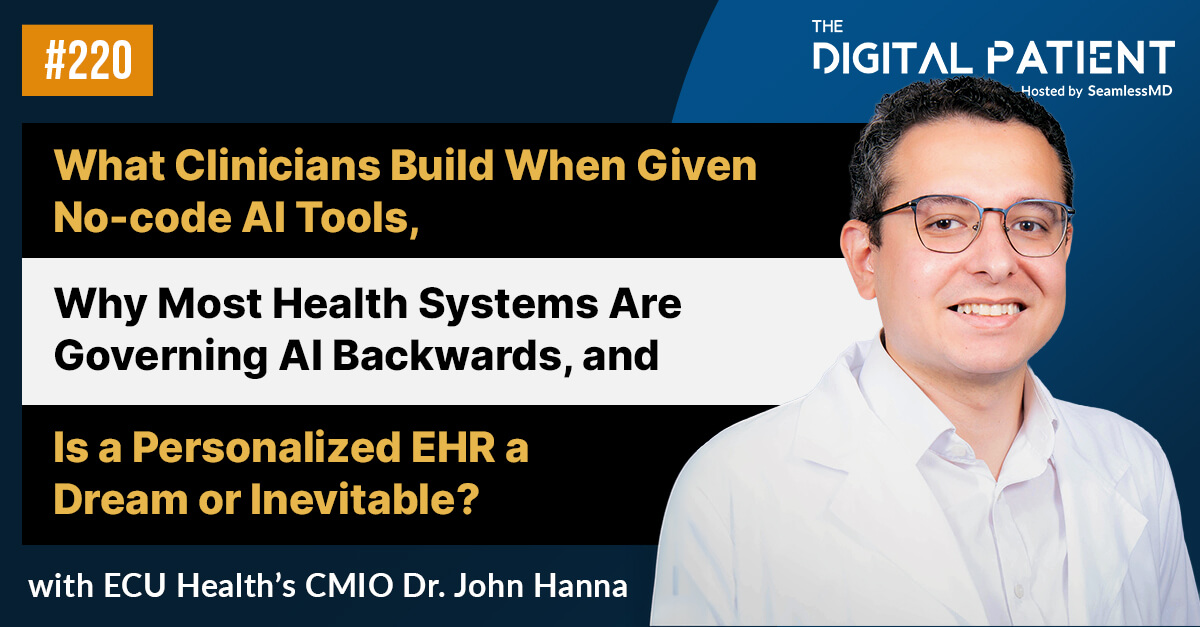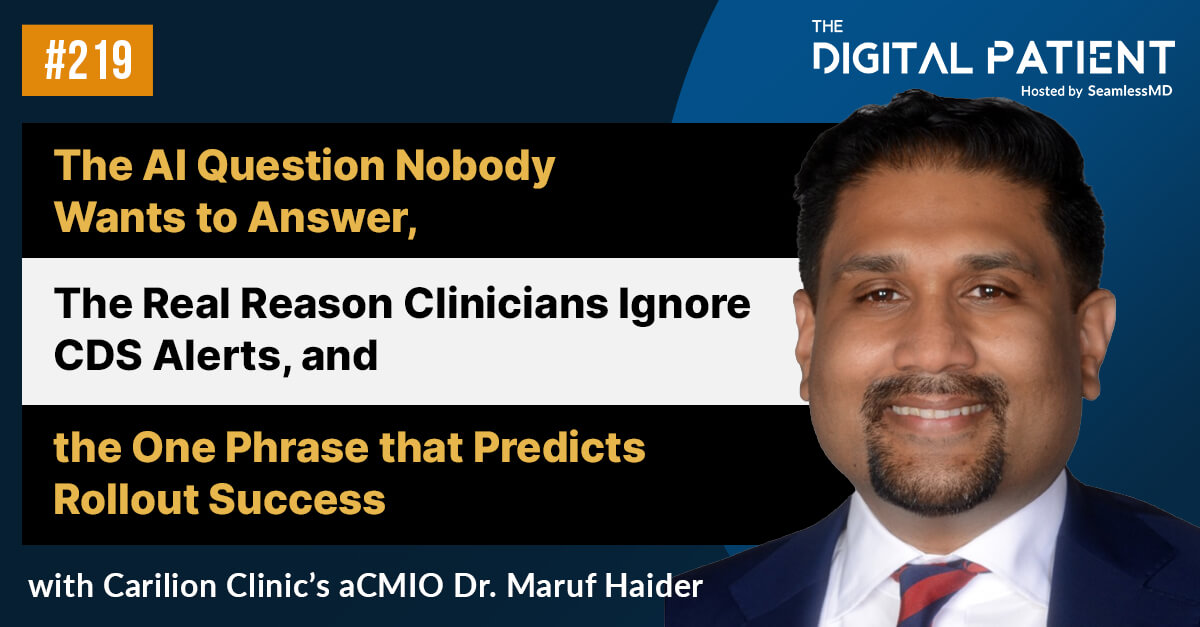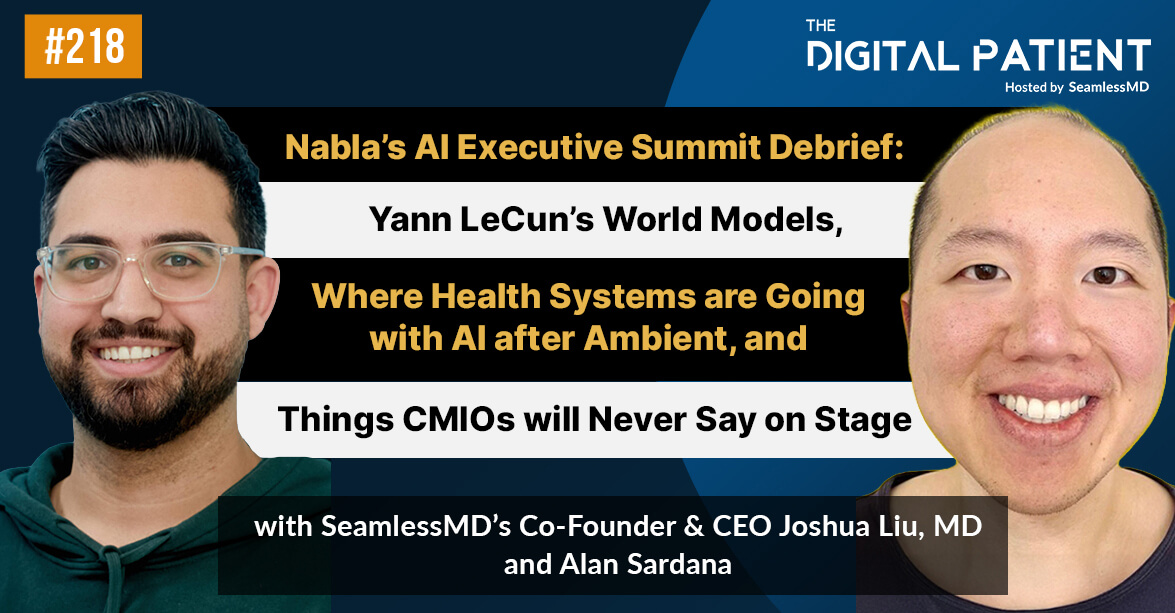Subscribe on: RSS | SPOTIFY | APPLE PODCAST | GOOGLE | BREAKER | ANCHOR
Video:
In this episode of the SeamlessMD Podcast, Dr. Joshua Liu, Co-founder & CEO at SeamlessMD, and marketing colleague, Alan Sardana, chat with Malvina Ibrahim, RD, MHSc, Patient Education Specialist at SeamlessMD about using digital patient engagement for Endocrine surgery. See the full show notes below for details.
Guest(s): Ms. Malvina Ibrahim, RD, MHSc, Patient Education Specialist at SeamlessMD
Dr. Joshua Liu (@joshuapliu), Co-founder & CEO at SeamlessMD
Episode 24 – Show notes:
[00:23] Introducing Ms. Malvina Ibrahim, Patient Education Specialist at SeamlessMD
[01:53] How SeamlessMD differentiates various education material based on the specific surgery type AND tumor type so that patients receive the right information for them;
[02:50] How Endocrine surgery patients care about topics that are relevant to their specific surgery & tumor type, for e.g. All adrenal patients except with a non-functional tumor would care to track blood pressure & heart rate more than other Adrenal patients;
[04:12] Why Ms. Ibrahim designs Endocrine surgery digital patient engagement programs with older patients in mind despite the average patient age being below 60 to accommodate for outliers and to ensure the overall program has high accessibility & engagement rates;
[07:15] Why Ms. Ibrahim programmed the platform to differentiate tumor types (ie. Non-functional, pheochromocytoma, aldosterone-secreting, cortisol-secreting) so that each Endocrine surgery patient receives the right education & reminders unique to their journey (e.g. specific diet with increased sodium or recommendations to take an alpha-blocker, etc.);
[08:46] How SeamlessMD triages Endocrine patients based on surgery type (e.g. Lobectomy vs. Total thyroidectomy), tumor type (e.g. Non-functional, pheochromocytoma, aldosterone-secreting, cortisol-secreting, etc.) and other conditions (e.g. Graves’ Disease, neck dissection, etc.) to provide a personalized experience with the right education, reminders, follow-ups and survey questions for each patient;
[10:00] How traditional paper-based education for Endocrine surgery is typically generic with nuances being explained verbally or handwritten, which is difficult to follow, comprehend, and remember;
[11:11] How SeamlessMD is able to automatically track patient compliance, post-op symptoms, and identify signs of complication, etc. based on each patient’s unique profile (for e.g. only patients who need to track calcium receive information & tracking questions for calcium);
[12:30] How Endocrine surgery patient information is often very clinical and difficult for the average patient to understand (e.g. Hypocalcemia), and how SeamlessMD translates all patient-facing material to a grade 6 or below reading-level to ensure accessibility and compliance;
[14:30] How Digital Patient Engagement provides clear instructions for patients based on specific questions that help track symptoms that might otherwise be missed such as post-op muscle weakness or word-finding difficulty in adrenal patients with a cortisol-secreting tumor;
[17:00] Why patients often don’t feel comfortable asking specific clarification questions because their surgeon is busy and they don’t want to be intrusive, and how digital patient engagement circumvents this barrier by explaining everything in plain language and by prompting clarification questions;
[18:00] How SeamlessMD adapts symptom-tracking surveys to provide each patient the right care and self-management education (e.g. Thyroid patients with neck dissections can track drain output volume, receive self-care tips on how to take care of their drains, and understand when to reach out to their healthcare team if there is a problem);
[19:40] How SeamlessMD includes specific regimens for supplements, diet, activity, etc. unique to each patient and how the platform explains why each topic/task is important to boost adherence;
[22:00] How SeamlessMD tracks various patient-reported outcomes peri-operatively including embedded validated surveys for Endocrine surgery such as SF-36 QoL at various touchpoints;
[24:24] Dr. Liu’s fun fact about Quality of Life surveys and why the SF-36 is considered “short” because the original validated survey had 116 questions;
[26:00] Why patients love digital patient engagement for Endocrine surgery because of its ability to set proper expectations, relieve worries and stress, and for its ability to reassure the patient if they are healing as expected via wound images comparing their own incision vs. infected incision photos, or escalate the patient if they have a problem;
[28:36] Why Ms. Ibrahim loves working with Endocrine surgery teams because they tend to be smaller teams comprised of clinicians who are dedicated, passionate, and innovative;
[28:50] Lightning Round / Fast Five:
Q: How has a failure or apparent failure set you up for later success? Do you have a favorite failure?
A: My favorite failure is not getting a dietetic internship on my first try; this allowed me to mature, work on myself, and get clarity on my long term plan.
Q: Would you rather have Invisibility or Super strength?
A: Invisibility.
Q: What is your favorite movie?
A: I prefer TV shows; my favorite is “This Is Us” or “The Office”
Q: If you could live in any other period of time, when would it be and why?
A: The 1920s. I want to experience what it was like during prohibition and the various freedom movements.
Q: If you could have a gigantic billboard with anything on it – metaphorically getting a message out to millions of people – what would it say and why?
A: You don’t know what other people are going through… and sometimes you need to be reminded of that… So, my billboard would say: “Be simple and straightforward”
.svg)









.png)
